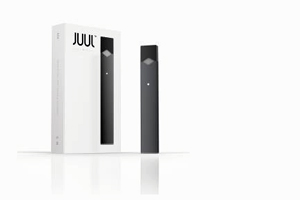NYT columnist comments on Juul Labs’ new ad campaign

Courtesy: Juul Labs
Writing in his “The Shift” column in the New York Times, Kevin Roose said Juul Labs’ new $10 million “For smokers. By design” TV ad campaign, called “Make the Switch,” which features testimonials from former smokers, who are above the legal smoking age and have used Juul to quit smoking, suggests that the company “really, really, really cares” about “nicotine-addicted adult smokers” and wants them to “switch to something far less likely to kill them,” but “plenty of evidence suggests that the company didn’t always take its public health agenda so seriously.”
Juul Labs, which is valued at $38 billion, “has been through the wringer lately, with regulators, public health advocates and concerned parents “accusing it of fueling an epidemic of teenage nicotine addiction by marketing to young people with fruit-flavored pods, colorful youth-filled ads and social media campaigns,” Roose noted.
While users have sued Juul Labs, the Food and Drug Administration, “which is investigating whether Juul’s marketing practices deliberately targeted underage users, conducted a surprise inspection of the company’s headquarters last year.” On November 12, 2018, Juul Labs announced that it will stop selling most of its flavored products, except menthol and tobacco, in retail stores, effective immediately, and close its Facebook and Instagram accounts in the US that promote the use of its flavored pods. “Adding to the concern,” Altria purchased a 35% stake in Juul in a $12.8 billion deal announced December 20, 2018.”
While Juul Labs is “far from the first company to attempt a humanitarian makeover,” its “revisionist history is particularly important, because the way Juul markets itself is central to the question of how it should be treated,” Roose noted, adding that “many consumers, investors and ethical technologists would rightly shun a company that knowingly targeted minors with harmful products, and cleaned up its act only after public pressure.
But if you believe that Juul had a noble anti-cigarette mission all along, it’s easier to excuse its missteps as the product of innocent naïveté.” In a 2015 interview with The Verge, Ari Atkins, a research and development engineer who helped create the original Juul, said “we don’t think a lot about addiction here because we’re not trying to design a cessation product at all … anything about health is not on our mind.”
James Monsees, Juul Labs’ co-founder and chief product officer, said in a 2014 interview that although the company since 2005 has focused on “creating a product to help people switch away from smoking combustible cigarettes – the number one cause of preventable death in the world,” it is “not an activist company. If you don’t like what we’re making better than cigarettes, then have a cigarette, that’s fine.”
In a 2007 email to potential investors, Adam Bowen, Juul’s other co-founder, mentioned the company’s desire to “offer a new alternative for health-conscious smokers.” However, Juul Labs’ efforts to pitch vape devices as “a healthier substitute for cigarettes” goes against its marketing campaigns, as “few of the company’s early ads made any mention of cigarettes’ risks, or advocated for smokers to switch; most were focused on playing up vaping’s cool factor,” Roose noted. In 2017, Juul Labs’ website “said nothing about switching from cigarettes at all, only that the Juul offered an ‘’intensely satisfying vapor experience.’”
However, Juul Labs, “now equipped with an army of lobbyists and a slick communications team that includes a former White House spokesman – has studiously revamped its image,” with “glossy profiles … written about the company’s ‘lifesaving mission.’” Juul’s new Chief Executive Officer Kevin Burns also emphasized the company’s focus on adult smokers. “This abrupt about-face has drawn skepticism from critics,” with Matthew L. Myers, president of the Campaign for Tobacco-Free Kids, describing Juul Labs’ new ad campaign “as little more than a P.R. effort aimed at lawmakers and regulators.”
Juul Labs “has engaged in all the traditional tactics of a company that is trying to fend off meaningful regulation, rather than actually change their behavior. That is classic Big Tobacco,” Myers noted. “No one is suggesting that Juul’ nicotine pods are less healthy than cigarettes, or that the company should stop marketing itself as a smoking alternative,” but “motives matter. And Juul’s shifty self-presentation suggests that the company may not be acting entirely on the level,” Roose added.